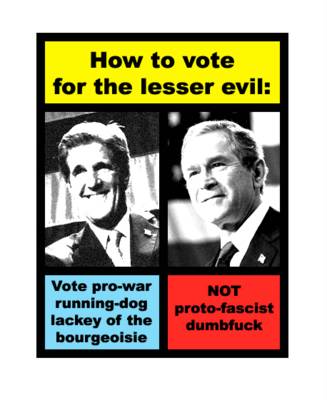
John Kerry is pro-free trade, pro-war, pro-Israel, would expand the number of troops in Iraq and has said that he would be willing to appoint anti-abortion judges (just not to the Supreme Court. However, while Bill Clinton was similarly seen by mainstream feminists as being pro-choice, through social programme cutbacks [i.e., the closure of clinics], on-the-ground access to abortion actually declined precipitously on his watch, and the centrist, Democratic politics of Kerry suggest that he would be no different on this front. Access to abortion, as should not have to be pointed out, is the product of two things: the law and funding. To have the former without the latter is to be objectively anti-choice, no matter the rhetoric) and his campaign is dependent on corporate support as much as that of George Bush. He will make no attempt to curtail (and certainly not dismantle) America’s empire of bases (there are a hundred and ninety one countries in the United Nations; one hundred and thirty of them have an acknowledged US base or significant military presence), or put an end to America’s genocidal foreign policy. On Venezuela and Haiti, Kerry is downright reactionary, supporting as he does the far-right opponents of Hugo Chavez and the death-squad alumni who orchestrated the US-sponsored coup against Jean-Bertrand Aristide.
Indeed, it is not so much the substance of a Kerry administration that would differ from that of Bush, but the style. In many ways, the Bush II administration has undone the two-century-old system of diplomacy, wherein, to put it simply, bad men are permitted to do bad things, but they have to be gentlemanly about the whole business. Bush makes no pretence. Instead of the normal way of making something like Kyoto essentially toothless (not that it was especially toothsome to begin with), which would be to incrementally behind the scenes make sure everybody agrees to do nothing while pronouncing great advances in tackling climate change, Bush simply said ‘fuck it’. In many ways this is why so much of the US and international business, political, military, security and diplomatic establishment are behind Kerry: not because they are liberals, but because ‘that’s just not the way things are done, my boy!’ Bush’s bookless, thuggish approach to international diplomacy exposes the mendacity of elites too manifestly, awaking quickly global outrage and resistance. Better to triangulate like Bush Sr., Clinton, Blair…or Kerry.
Out of the major policy issues, there are only two that separate the candidates from the two different wings of the American Business Party: health care and the death penalty.
It no small relief that for once there is an American presidential candidate who is opposed to the death penalty, but even here, where have we seen the candidate speak out on the issue? His failure to address this question must give some indication of the amount of attention a Kerry administration would pay to dismantling the US criminal death machine. Furthermore, his running mate is pro-death penalty. (It may be pointed out here that John Edwards is anti-Nafta, but whether he is honestly committed to fair trade, or he merely profitably used the issue to advance in the Democratic primaries, an overwhelmingly pro-free trade Democratic Congress and DLC would hardly let his feelings in any way influence US trade policy, never mind the fact that to genuinely remove the retrograde aspects of corporate-led globalisation is to remove its raison d’etre. An effective attack on the Washington Consensus is fundamentally an attack on capitalism or it is nothing, but that is a tale for another night, boys and girls)
However, on the issue of health care, Kerry would make a considerable difference. As economist and New York Times columnist Paul Krugman has pointed out, the Kerry health care plan would reduce the number of uninsured Americans by 26.7 million (paid for by rescinding that part of the Bush tax cut that went to the three per cent of Americans that earn over US$200,000). Even with the inevitable watering down of the proposal that would accompany its passage, this is no small bagatelle. And yet it is still so far from the single-payer universal coverage that is needed and that exists in almost every other western country.
Radical US historian Howard Zinn has said, similar to Noam Chomsky and Michael Alberts’ formulation for lesser-evil voting in November, Kerry gives us a ledge from which to fight. Under Bush II, there is no ledge. This is perhaps the most honest assessment of the dilemma. Democratic liberals simply present themselves as partisan nincompoops when they suggest that they actually Believe In Kerry. Nobody believes in Kerry. Anybody but Bush is the order of the day.
And yet, objectively, the maximum support possible for Nader goes further to establishing the sort of alternative that will deliver the sort of world we all want than a Kerry victory. During the recent federal election in Canada, I had arguments with progressive friends of mine who, once again, were considering voting Liberal, rather than NDP, to keep out the Conservatives (despite the fact that the NDP is often as likely to take votes from working class and rural former Reform Party voters as it is from urban Liberal voters). One friend of mine, never a Trot, but fellow traveller nonetheless, said that, despite despising the Liberals, she was going to vote for them because ‘fewer people will die under the Liberals than under the Tories’. I countered by saying that while true in the short term, the maximum support for the NDP advances the day that they come to office federally in Canada, thus over the longer term, fewer people will die if she voted NDP, regardless of whether that translated into a Conservative government. It was simply mathematical:
If we can assign arbitrary figures to Conservative, Liberal and NDP ‘dead’ (people who will die as a result of their policies) - say, five, four and one, respectively (for the sake of simple math - obviously the numbers are far higher) - then it follows that, over a five-term election cycle, with a Conservative government elected in the first two terms and (due to the advancement of the NDP, aided in part by her vote) the NDP elected in, say, the third through fifth terms, we have thirteen dead in total. Consistently voting Liberal to keep out the Tories, on the other hand, works out to be twenty dead in total. [(C * 2)+(n * 3) = 13; L * 5 = 20]
The same follows for the US, or any jurisdiction (By the way, she voted NDP in the end, and the Liberals won a minority, with a somewhat larger NDP contingent in parliament).
There is, however, one last reason for voting for Kerry.
Recognising the central role of the US working class to global transformation, we (the global justice movement) need another Lyndon Johnson.
The extremity of Bush II on all issues, but the war in particular, has galvanized the US populace like nothing since Vietnam. This is manifest. As the war progresses, Americans (and, particularly and very importantly, working class Americans in the so-called flyover states) are becoming militantly opposed to their country’s actions, are discovering the real history of American foreign policy and taking action. At the moment, while there have often been very large demonstrations - some of them the largest in US history - the focus is on electing a Democrat to the White House. And yet if Al Gore had been in the White House on 11 September, he would certainly have bombed Afghanistan and those who suppose that he would not have gone after Saddam Hussein are kidding themselves. Clinton and Blair’s Yugoslav adventure, not to mention their own 1998 bombing campaign against Iraq, do nothing to suggest that Gore’s response would have been markedly different. Indeed, in the nationalist, hyper-militarist atmosphere following the September attacks, facing down Republicans who would call his response weak whatever he did, a President Gore would as likely as not have been more hawkish than Bush, lest he lose the mid-term elections or this year’s presidential election.
But the liberal-left persists in putting its hopes in the Democratic Party. For a true advance to happen in the US, there has to be a widespread break with US liberalism.
If Kerry wins in November, the war will not end. Kerry will not pull out of Iraq, and Al-Qaeda will not disarm. As the war advances, whether through Kerry’s continued occupation of Iraq or his response to the certain next atrocity on US soil by the Islamists, more and more Americans will oppose the war. The liberals who then continue to support a now Democratic war will be cut off from the growing majority of Americans who want an end to it. This time it will be a Democratic president against whom they will be marching.
Another LBJ. As in, ‘Hey, hey, LBJ! How many kids have you killed today?' - and the rest of the revolutionary explosion of the late sixties.
































<< Home